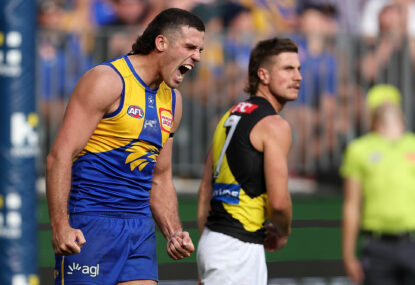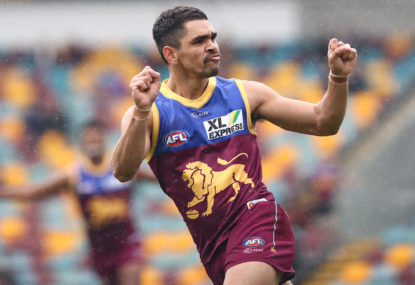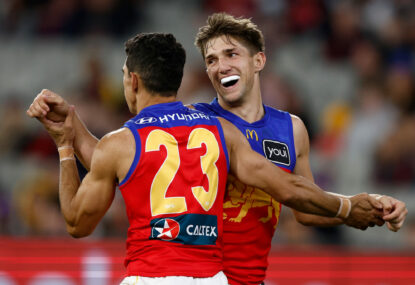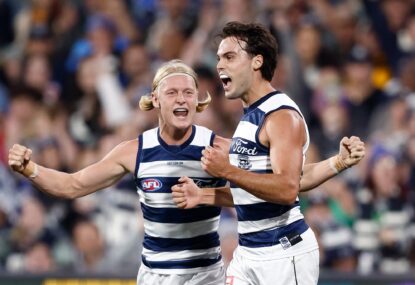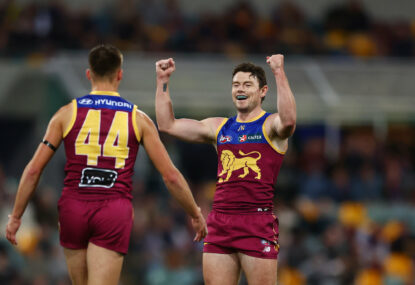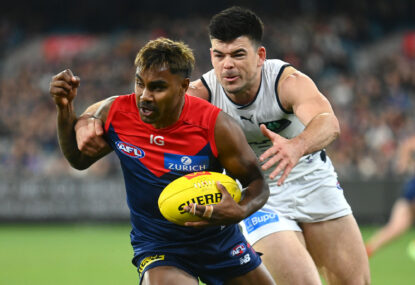
Melbourne players celebrate after the AFL Round 18 match between the Brisbane Lions and the Melbourne Demons at the Gabba, Brisbane. Slattery Images
Having had their finals door shut on Sunday evening by a spirited Richmond comeback, Melbourne can now throw away any chance of mathematic possibilities and focus on what shapes as an important offseason for the Demons.
Coaching speculation has been written to death in these past weeks but it is important to remember that there is an entire football department which contributes to on-field success. Beyond the football department, the business operations of a club have a major impact on culture.
Fortunately for Melbourne, there is no shortage of finance at the club and they are operating more comfortably now than in the past courtesy of Jim Stynes, who has inspirationally led the club through debt demolition.
Having completed his third season at Melbourne as General Manager (List Management), Tim Harrington has been called upon to extend what began as a five year list management plan.
Harrington has returned excellent results, producing critical contract extensions from Max Gawn, Luke Tapscott and most importantly Jack Trengove. All are pivotal to the future of the Demons.
As impressive as Trengove’s four year extension is, it is Harrington’s commitment to his initial five-year plan that will see Tom Scully move to Greater Western Sydney. Scully is all but officially gone, partially due to Melbourne’s choice not to meet the offer off GWS.
Reportedly worth $1m a year, Harrington is the man who knows how much Melbourne value Scully.
Based on interim coach Todd Viney’s decision to only play Scully off half back rather than in the midfield, it could be assumed that Melbourne has conceded that Scully is not worth $1m per year and the money could be better spent within the salary cap.
As mentioned earlier, success doesn’t just come from the senior coach. Here are four things which should be addressed if Melbourne is serious about creating a winning culture capable of matching their potential.
1. Garry Lyon
Speculation has been rife with what he will do when his three month term ends and there are only two options. He must either stay away from the club or he must take on an official role.
It is his part time unofficial access to the Melbourne Football Club that contributed to the failure of Dean Bailey. When a new coach comes in, this cannot happen. By speaking with players at his convenience, it undermines the coaches within the club.
The other option of taking an official role at the club is more likely, because he is an integral member of the club who can articulate a vision for the future. Two options exist. He must either succeed Chris Connelly as General Manager of Football in a full time capacity or he must take control of the board and be appointed President of the club.
This would mean Jim Stynes standing aside to fight a more important cause. Lyon would perform the job on a part-time basis while still fulfilling but reducing his media commitments. James Brayshaw and Eddie McGuire do the exact same job at North Melbourne and Collingwood respectively.
2. Todd Viney
One of Gary Lyon and Jim Stynes’ best mates, Viney has done the club no harm as the caretaker coach. Having voiced his intentions not to apply for the senior job, Viney will still be at the club next year.
An astute thinker in the football community, Viney has built a reputation as one of the best assistants in the league following stints at Hawthorn and Adelaide.
Doubling up as General Manager (Player Development) as well as senior assistant coach, Viney is particularly close with the young players who are driving the club forward. He must continue this development role because he remains the key link following Dean Bailey’s departure.
Player development is often only watched on-field but he does plenty behind the scenes. Viney’s role sees him closely work with youngsters to produce professional mentalities intent of winning while promoting leadership.
This cannot be lost or changed. Whoever comes in as senior coach must keep Viney as his senior assistant.
3. The Captain
Brad Green will not captain the club to its next premiership but is too valuable of a leader to not have his playing contract renewed. Melbourne must not make the same mistake as they did with Cameron Bruce and James MacDonald.
Green does not need to kick bags every week to hold his spot in the team, but if he can chime in one or two goals a week, his leadership makes up for it.
It would be in the clubs interest for him to stand down at the end of the year to give a young captain an extra year of captaincy experience.
There are only two contenders and they are Jack Trengove, 19 and Jack Grimes, 22. Both are exceptional players and Grimes is currently in the leadership group but has only played a handful of games due to a season -ending foot injury.
Trengove has shown exceptional commitment to the club by resigning for four years, where a two or three year extension would have seen more money in his next contract.
On the field he is as courageous as any, and a genuine contested football winner. He will be 20 next year and the last player to be appointed so young was Wayne Carey at the tender age of 21.
4. Jack Watts
Watts is not the marking player he was expected to become. He has had what some would consider a successful year by accumulating possessions, but it may disappoint supporters that the possessions have been mostly won on the wing and in defence.
Although he is playing with more confidence than in his first two years, he continues to struggle with the expectations of him being a number one draft pick.
He made no effort to hide this on the weekend when he appeared on Before the Game. Opting to avoid any Nic Naitanui discussion, he was later asked how many goals he would kick against Richmond where he answered “I’ll kick two tomorrow.”
This is not what supporters want to be hearing and it illustrates the lack of confidence he has in himself to kick goals.
It may not have been realistic, but an answer of five or six would have been great just to show some energy in a rare public appearance from Watts.
Tall players take longer to develop but Watts now sits behind Nic Naitanui, Michael Hurley, Tyrone Vickery, Phil Davis, Jackson Trengove and Zac Clarke who were all drafted in the same year as him. Do not rule out Jack Watts being traded.
The only way Watts will establish confidence is if he can silence the critics by kicking goals. With inside 50 delivery set to drastically improve as the core of midfielders mature, Melbourne must make a call on the forward structure.

Melbourne players celebrate after the AFL Round 18 match between the Brisbane Lions and the Melbourne Demons at the Gabba, Brisbane. Slattery Images
Watts can either play as the key target or Melbourne must acquire a key marking forward. John Butcher is reportedly looking for a move back to Victoria but Melbourne has little trading currency and is too high on the ladder to land him in the pre-season draft.
A new senior coach appointment is inevitable but there are many other areas at the club which will take shape in the off-season. The time is approaching where Melbourne can be judged on their performance when early draft picks enter maturity.
Like him or not, Dean Bailey and Tim Harrington have positioned Melbourne beautifully for any incoming coach to take over and achieve success quickly.






























































































